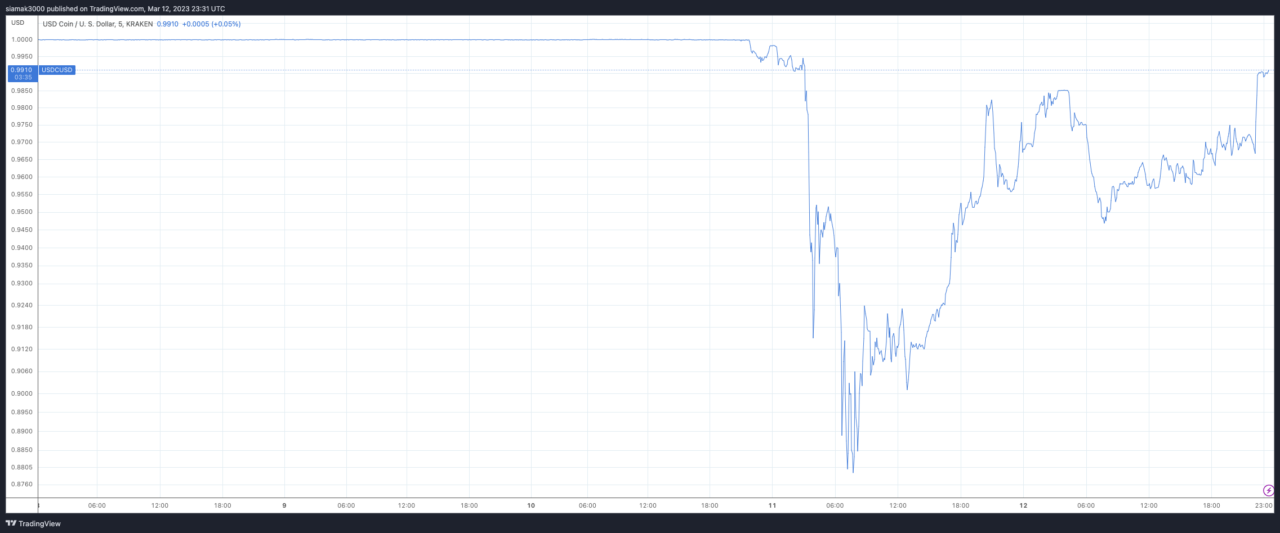On Sunday (March 12), the crypto market had a great to reason to cheer after U.S. Secretary of the Treasury Janet L. Yellen, Federal Reserve Board Chair Jerome H. Powell, and FDIC Chairman Martin J. Gruenberg released a hugely important joint statement.
As you probably already know, on Friday (March 10), Silicon Valley Bank (SVB) was closed by Californian regulators and placed under the control of the US Federal Deposit Insurance Corporation (FDIC).
SVB has $175 billion in deposits, 89% of which is uninsured. At the time of its failure, SVB was the 16th largest bank in the U.S. and the largest bank by deposits in Silicon Valley, the home of some of the biggest names in tech (including Ripple).
Earlier today, the Washington Post reported that “Federal authorities are seriously considering safeguarding all uninsured deposits at Silicon Valley Bank, weighing an extraordinary intervention to prevent what they fear would be a panic in the U.S. financial system, according to three people with knowledge of the matter, who spoke on the condition of anonymity to describe private deliberations.”
Well, a short time ago, the U.S. Department of the Treasury published a Joint Statement by the U.S. Department of the Treasury, the Federal Reserve, and the FDIC as a press release.
According to this statement, the three aforementioned parties have decided to take actions that ensure full protection for all depositors at Silicon Valley Bank and at Signature Bank (which was shut down today):
“After receiving a recommendation from the boards of the FDIC and the Federal Reserve, and consulting with the President, Secretary Yellen approved actions enabling the FDIC to complete its resolution of Silicon Valley Bank, Santa Clara, California, in a manner that fully protects all depositors. Depositors will have access to all of their money starting Monday, March 13. No losses associated with the resolution of Silicon Valley Bank will be borne by the taxpayer.
“We are also announcing a similar systemic risk exception for Signature Bank, New York, New York, which was closed today by its state chartering authority. All depositors of this institution will be made whole. As with the resolution of Silicon Valley Bank, no losses will be borne by the taxpayer.
“Shareholders and certain unsecured debtholders will not be protected. Senior management has also been removed. Any losses to the Deposit Insurance Fund to support uninsured depositors will be recovered by a special assessment on banks, as required by law. Finally, the Federal Reserve Board on Sunday announced it will make available additional funding to eligible depository institutions to help assure banks have the ability to meet the needs of all their depositors.“
This announcement is great news for the crypto market, which heavily relies on dollar-backed stablecoins; this is especially true for $USDC since Circle had $3.3 billion of $USDC’s cash reserves at Silicon Valley Bank; now, we know it will be getting all that money back on Monday (March 13).
However, the closing down of Silvergate Bank, Silicon Valley Bank, and Signature Bank, which were three of the largest crypto-friendly banks in the U.S., makes life more difficult for crypto firms based there, although some believe that some progressive banks will step forward and express willingness to work with crypto firms.
According to data from TradingView, $USDC is currently (as of 10:33 p.m. UTC on March 13) trading at around $0.9935 on Kraken:

As for the rest of the crypto market, the price for almost every cryptocurrency among the top 50 is up in the past 24-hour period. For example, Bitcoin and Ethereum are up 6.61 and 6.84%.
Image Credit
Featured Image via Pixabay









